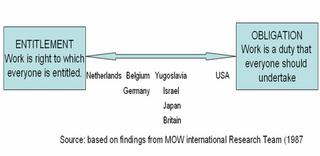This topic reflects the importance of doing one's utmost to seek paid employmeny rather than remaining 'idle'. In the UK such an obligation to work is enshrined within the social welfare system because a person must prove they are 'actively seeking work' before they are entitled to any welfare benefits. However studies of the attitudes of the unemployed reveal that there is a widespread desire not to be perceived as 'lazy', even if remuneration levels from work are only marginally higher than unemployment benefit(Turner, Bostyn and wight, 1985). To a large extent this may be the result of the desire to be a 'good provider' for one's family. being 'in work' not only conferred economic power on the individual, it helped to forge a musculine identity-a man who was unemployed, was not only unable to provide for his family, he was also less of a man. More recently, this has been illustrated in a study of the gender-specific consequences of unemployment in a town in Britain (McKee and Bell, 1986: 141).
The loss of the male economic provider struck deep chords among both wives and husbands and a possionates defence of men's right to provide was invariably raised............ Fundamental emotions concerning self-esteem, self-image, pride, views of masculinity, respectability and authority resounded in the expressions of both men and women.
Alternatively, it might be argued that the preception of work as the means of becoming a self-reliant provider for one's family is being eroded in Western capitalist societies because of the gorwth of unemployment. It is a forceful argument, particularly when there has been an abandonment of the political commitment to achieving full employment, meaning that some of the blame can be displaced onto the Government for failing to provide enough jobs.
An attempt to assess the pervasiveness of 'work as a duty' was taken in the international survey in the international survey on the Meaning of Working (MOW,1987). The researchers examined two issues:
1) Obligation to work: the view that everyone must work to the best of their ability and thereby contribute to society.
2)Entitlement to work: the view that everyone should have the right to a meaningful and interesting job with proper trainging.
These are two seperate dimensions, and so an individual's orientation to both can be measured. The MOW researchers were able to plot the responses from each country to demenstrate how the orientation to (1) obligation to work (duties) and (2) entitlement to work (rights) can vary in different national settings. The important aspect to consider from these findings is the overall balance exhibited by respondents from each country-these differences are illustrated in figure as below:
The loss of the male economic provider struck deep chords among both wives and husbands and a possionates defence of men's right to provide was invariably raised............ Fundamental emotions concerning self-esteem, self-image, pride, views of masculinity, respectability and authority resounded in the expressions of both men and women.
Alternatively, it might be argued that the preception of work as the means of becoming a self-reliant provider for one's family is being eroded in Western capitalist societies because of the gorwth of unemployment. It is a forceful argument, particularly when there has been an abandonment of the political commitment to achieving full employment, meaning that some of the blame can be displaced onto the Government for failing to provide enough jobs.
An attempt to assess the pervasiveness of 'work as a duty' was taken in the international survey in the international survey on the Meaning of Working (MOW,1987). The researchers examined two issues:
1) Obligation to work: the view that everyone must work to the best of their ability and thereby contribute to society.
2)Entitlement to work: the view that everyone should have the right to a meaningful and interesting job with proper trainging.
These are two seperate dimensions, and so an individual's orientation to both can be measured. The MOW researchers were able to plot the responses from each country to demenstrate how the orientation to (1) obligation to work (duties) and (2) entitlement to work (rights) can vary in different national settings. The important aspect to consider from these findings is the overall balance exhibited by respondents from each country-these differences are illustrated in figure as below:


No comments:
Post a Comment